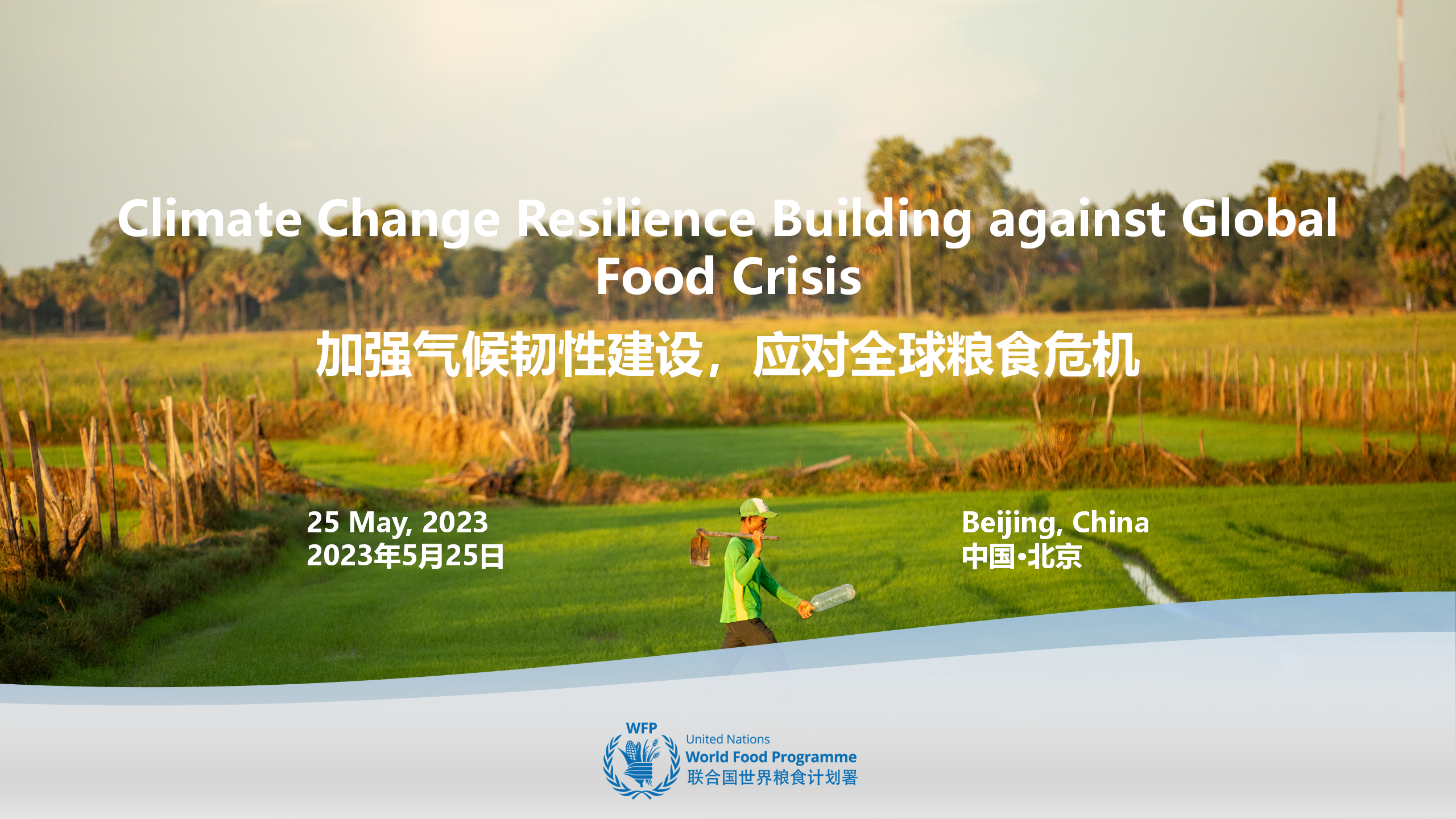
Background
In 2023, the world is facing a global hunger crisis of unprecedented proportions. Since the beginning of the COVID-19 pandemic, in just two years, the number of people facing, or at risk of, acute food insecurity increased from 135 million in 53 countries pre-pandemic, to 345 million in 82 countries today. Fuelled by conflict, climate shocks and COVID-19, the crisis is escalating as the war in Ukraine drives up the costs of food, fuel, and fertilizers. Millions of people are struggling to put food on the table and are being driven closer to starvation in a storm of staggering proportions.
Climate change is one of the greatest challenges of the 21st century while a more urban and affluent population of 9 billion is expected to be fed by 2050. We are at a critical crossroads. We need to rise to the challenge of meeting people's immediate food needs while supporting programmes that build long-term resilience. The alternative is hunger on a catastrophic scale.
The COP26 focused on accelerating efforts to limit global warming to 1.5°C above pre-industrial levels, crucial for reducing the risks of climate change’s impact on food security. Sessions were held to address the impact of climate change on agriculture. Following the Glasgow Climate Pact, discussions should continue to happen on the role of sustainable food systems in mitigating climate change, and the building of climate-resilient food systems.
The UN Food Systems Summit held in 2021 aims to deliver progress on all 17 of the SDGs through a food systems approach, leveraging the interconnectedness of food systems to global challenges such as hunger, climate change, poverty, and inequality. The Special Envoy for the UN Food Systems Summit has called for the UN Climate Change Conference to focus on food systems in COP27, emphasizing the need for food systems to adapt to climate change and be resilient enough to continue nourishing people and advancing prosperity and equitable livelihoods. Failure to address food systems-driven climate emissions could jeopardize the 1.5°C target and result in significant impacts on food systems.
Among the Country Pilot Projects WFP China COE has worked on over the past 2 years, many countries showed demands for climate resilience building. Demand-driven country pilot projects implemented by WFP China COE showed many countries' need for climate resilience building capacity. A climate change and rural resilience transformation project was conducted in Ethiopia, a workshop on distributed photovoltaic power generation and designing was held in Armenia, and a photovoltaic system powering a local flour mill was designed in Tanzania. These countries, despite locating on different continents, have rising demand to learn from China to mitigate the impact of climate change.
Rationale
Both policy-level and technical-level approaches are critical to building climate-resilient food systems. It is valuable to share such initiatives through South-South Cooperation for idea exchange and potential collaborations.
China has been working to address the impact of climate change on food security and has developed a series of policies. The Ministry of Ecology and Environment (MEE), the National Development and Reform Commission (NDRC), and 17 other departments jointly issued the National Climate Change Adaptation Strategy 2035. The goal of the strategy is to improve China's climate change adapting capacity, including adaptation to changes in areas such as agriculture, forestry, and fisheries, to ensure food security and sustainable development of rural societies. These policies demonstrate that China is taking proactive measures to address the impact of climate change on food security, and to improve agricultural productivity and adaptive capacity through measures such as the promotion of new energy technologies.
Climate resilient crop is one of the technical approaches to build food systems resilience against climate change. Millet is a versatile crop that can contribute to a range of important goals, including empowering smallholder farmers, achieving sustainable development, eliminating hunger, adapting to climate change, promoting biodiversity, and transforming agrifood systems. In recognition of the importance of millets, the United Nations has declared 2023 the International Year of Millets, with the Food and Agriculture Organization (FAO) taking the lead in celebrating the Year with other stakeholders. The International Year provides an opportunity to raise awareness of the potential of millets for cultivation under adverse and changing climatic conditions and to focus policy attention on this important crop.
New and renewable energy can contribute to addressing food security challenges. The United Nations has recognized the importance of promoting the use of new energy sources in agriculture to increase productivity, reduce costs, and improve access to energy services in rural areas. In this regard, the UN has developed policies and initiatives aimed at promoting the use of renewable energy in agriculture, including bioenergy, solar, wind, and hydro energy. Through multiple Country Pilot Projects, WFP China COE has been promoting new energy in needed countries including solar-driven irrigation systems and solar-driven grain warehouses.
Objective
1. To exchange insights on innovative approaches for climate-resilient food systems;
2. To raise awareness for national-level policy support in mitigating climate impact on food security;
3. In support of the International Year of Millet, promoting climate-resilient crops such as millets in adaptive regions;
4. Encourage new energy use in food production, processing and storage including but not limited to solar, wind, etc.
The Seminar will be structured in 3 sub-themes in accordance with the objectives:
Session 1. National Strategy on Building Climate Resilient Food Systems
Session 2. International Year of Millet
Session 3. New Energy against Climate Change
Event arrangement
Hybrid format with onsite event in the UN compound in Beijing and Zoom meeting virtually.
Language
The event will be in English, Chinese, and French language. Simultaneous Interpretation will be provided.
Cloud School Links
English Version
https://cloudschool.wfpchinacoe.net/course.html?id=134
French Version
https://cloudschool.wfpchinacoe.net/course.html?id=138

